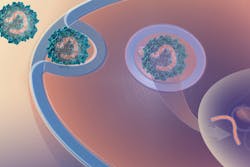A new approach to direct the body to make a specific antibody against HIV led to sustained production of that antibody for more than a year among participants in a National Institutes of Health (NIH) clinical trial.
The drug-delivery technology uses a harmless virus to deliver an antibody gene into human cells, enabling the body to generate the antibody over an extended time. With further development, such a strategy could be applied to prevent and treat a wide variety of infectious diseases, according to the study investigators.
Researchers from NIH's National Institute of Allergy and Infectious Diseases (NIAID) reported the findings on March 9 in an oral presentation at the 2020 Conference on Retroviruses and Opportunistic Infections.
Antibodies are immune system proteins that help prevent or clear infections. Traditional vaccines induce the immune system to generate protective antibodies. Another approach to preventing infections is to deliver monoclonal antibodies—preparations of a specific antibody designed to bind to a single target—directly into people. Monoclonal antibodies also are used therapeutically, with many already approved for treating cancer, autoimmune diseases and other conditions and others being evaluated for treatment of infectious diseases, such as Ebola virus disease.
Administering proteins to people requires periodic injections or infusions to retain protective or therapeutic levels, which can be challenging, particularly in resource-limited settings. Delivery of antibody genes using a virus as a carrier, or vector, offers a potential alternative.
"Monoclonal antibodies hold enormous promise for preventing and treating both established and emerging infectious diseases," said NIAID Director Anthony S. Fauci, M.D. "Novel delivery platforms such as viral vectors could facilitate the future development and deployment of antibody-based prophylaxis and therapy, and these findings are a promising first step in that direction."
The drug-delivery system developed by scientists at NIAID's Vaccine Research Center (VRC) uses adeno-associated virus serotype 8 (AAV8) to deliver an antibody gene. AAVs—small viruses that do not cause disease in humans—have proven to be safe, well-tolerated vectors for gene therapy.
Building on this preclinical work, researchers designed a Phase 1 clinical trial known as VRC 603. It aims to assess the safety and tolerability of an AAV8 vector carrying an anti-HIV antibody gene in adults living with well-controlled HIV, and to evaluate whether it could cause human cells to produce the antibody. The vector carries the gene for an anti-HIV monoclonal antibody called VRC07, which was originally isolated from the blood of a person with HIV.
Study participants have not experienced any major side effects due to AAV8-VRC07. Some volunteers experienced transient mild tenderness at the injection site or mild muscle pain.
Administration of monoclonal antibody-based therapies sometimes results in a person's immune system developing antibodies against the therapy. Only three of the eight VRC 603 participants developed antibodies against VRC07; it is not yet clear whether these anti-drug antibodies could reduce VRC07's ability to neutralize HIV. The VRC 603 participants' HIV was kept under control with continued antiretroviral therapy during the trial.

